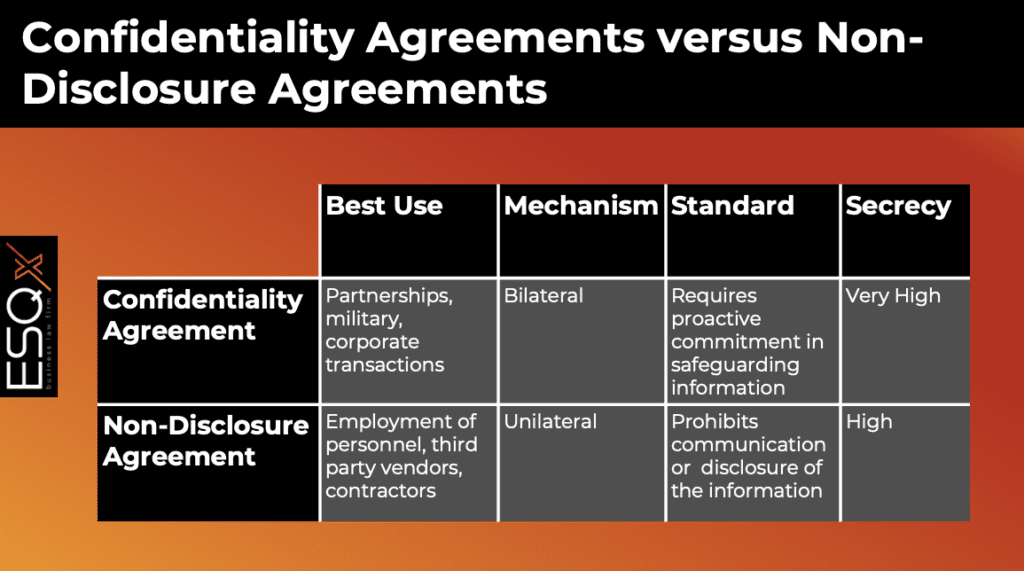The terms confidentiality agreement and non-disclosure agreement are used interchangeably in business, which makes it hard to tell the difference between them. What’s worse, both terms are ubiquitous in business situations, making it even more difficult to discern. However, what both of these concepts share is a basic characteristic: the security of private information.
Confidentiality agreements are legal documents which require one (or more) parties to keep secret information which has been deemed confidential. Any time sensitive business information, intellectual property, or trade secrets are meant to be kept out of the prying eyes of the public (and your business’s competitors), a confidentiality clause is often invoked to keep.
Slightly different, non-disclosure agreements (NDAs) are agreements between two or more parties prohibiting the unauthorized release of information deemed to be a secret. Although both concepts are similar, they are often used in different respects. If there is a one-way (also called a unilateral) communication of secret information, an NDA is usually a better idea. Conversely, a confidentiality agreement is more appropriate in partnerships. For example, if two business partners are working on a project where they are both creating intellectual property, this would require a confidentiality agreement.
What are the similarities and differences between the two types of agreements?

NDA Examples
- A technology startup may ask employees to sign an NDA prohibiting them from telling anyone about their software code.
- A famous restaurant may ask employees to sign an NDA before disclosing their secret recipe. We still don’t know what’s in Chick-Fil-A Sauce.
- A small business may ask employees to sign an NDA to protect their sales leads from being divulged to third parties.
- An inventor approaches a potential partner, buyer, or distributor about a business idea
- A business owner provides due diligence materials to a potential buyer by furnishing him with information related to profitability, clients, legal, marketing, promotional, and other activities.
- An innovator shows a new product or service to a potential buyer.
- A business will give employees access to a tech startup’s proprietary software code in the course and scope of employment.
Confidentiality Agreement Examples
- Two inventors decide to team up to produce the successor to the ShamWow, each pledging confidentiality to one another as they commence work.
- A famous band decides to begin work on their next album, with each band member promising not to discuss details with anyone until recording is finished.
- A company which produces oil rigs contracts with a third party manufacturer who produces components needed for manufacturing, with both companies pledging to not disclose any proprietary information learned during the course and scope of the project.
- A group of military experts convene in Washington, D.C. to discuss how the United States government should respond to civil unrest abroad.
- A corporate boardroom considers purchasing a rival company and discusses its financial information before making an offer to purchase it.
- A local business consortium meets in a private session to discuss whether to approach the local government about a tax grievance.
- A prominent regional grocery store hires a marketing agency to manage its SEO, and needs to disclose Google Analytics data in exchange for industry best practices.
Common Components
There are eight common elements that both NDAs and confidentiality agreements have in common:
- Description of why the agreement has been created
- Classifications of information that parties may not share
- The duration of the agreement
- The breadth and scope of the each party’s obligation
- A clear and detailed definition of what constitutes confidential information
- Provisions requiring parties to safeguard confidential documents
- Provisions describing the agreement’s enforcement
- Provisions for resolving a dispute
Know the Difference
The terms confidentiality agreement and non-disclosure agreement are so often confused that most people think they’re the same thing. As a business owner, it’s important that you are familiar with the nuances separating these two common concepts. If you are interested in drafting either a confidentiality agreement or an NDA, get in touch with an ESQx attorney today.






